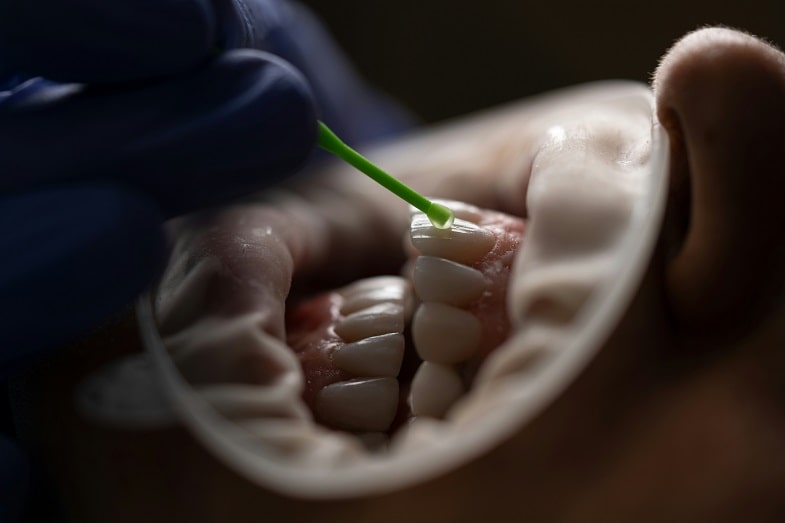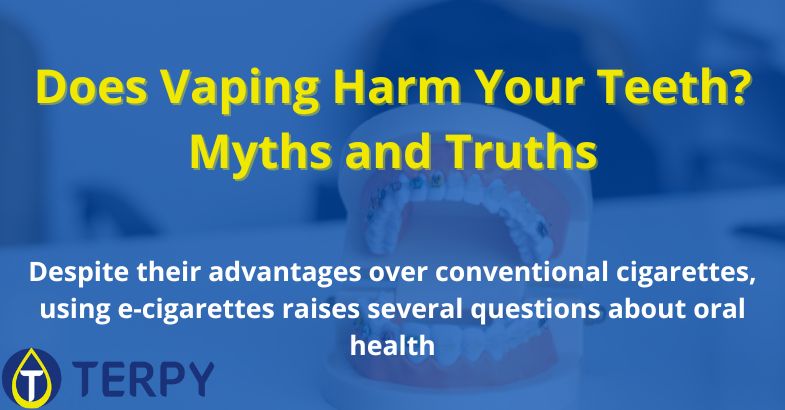Published on: 04/10/2024
Despite their advantages over conventional cigarettes, using e-cigarettes raises several questions about oral health
Dental hygiene is crucial for preventing cavities, gum disease, and other oral health issues, and the introduction of new products like e-cigarettes has sparked a heated debate about their effects on teeth and gums.
In this article, we will explore the connection between e-cigarette use and dental health in depth, offering practical tips for maintaining good oral hygiene for those using these devices. We will analyze the main components of e-cigarettes and their impact on the mouth, and provide specific suggestions to minimize potential risks.
How Do E-Cigarettes Work?
E-cigarettes, or e-cigs, are battery-powered devices designed to simulate the smoking experience. Instead of burning tobacco, they heat a liquid that produces vapor, which is then inhaled by the user. The liquid used, known as e-liquid or vape juice, generally contains nicotine, flavorings, and a base of propylene glycol and/or vegetable glycerin.
While the absence of combustion reduces exposure to many of the harmful chemicals found in traditional cigarettes, concerns remain about the long-term effects of e-cigarette use, particularly on oral health.
Read also: Electronic Cigarettes and Health: What Science Says
What Are the Components of E-liquids and Their Impact on Oral Health?
The first step in understanding the impact of e-cigarettes on oral health is to analyze the main components of e-liquid and how each interacts with the mouth. These components include:


- Nicotine: Even though present in varying amounts, nicotine is a key ingredient in e-liquid. Nicotine is known to constrict blood vessels, reducing blood flow to the gums and increasing the risk of periodontal disease. Additionally, it can promote plaque buildup and tartar formation, both factors contributing to tooth decay and bad breath.
- Propylene Glycol (PG): Propylene glycol is a humectant used to maintain moisture and create the throat “hit” typical of smoking. However, it can have a dehydrating effect on the mouth, reducing saliva, which is essential for neutralizing acids and preventing bacterial growth. Mouth dryness is a serious issue, as it can lead to an increased risk of cavities and oral infections.
- Vegetable Glycerin (VG): Vegetable glycerin is another common ingredient in e-liquids, responsible for producing dense and “sweet” vapor. Although generally considered safe, it can contribute to the formation of a sticky coating on teeth, promoting bacterial adhesion and increasing the risk of cavities.
- Flavors: Flavors are added to e-liquids to enhance the vaping experience, but some studies suggest that they may be irritating to oral tissues and contribute to gum inflammation.
What Are the Effects on Gums?
Gums are particularly sensitive to the effects of using e-cigarettes. As mentioned, nicotine can constrict blood vessels and reduce blood flow to the gums, making them more susceptible to infections and inflammation. Prolonged nicotine use can lead to gingivitis, which, if left untreated, can progress to periodontitis, a severe condition that may result in tooth loss.
Additionally, the dry mouth induced by propylene glycol and the bacterial buildup caused by vegetable glycerin can further exacerbate gum problems. Without sufficient saliva, the mouth loses its natural ability to wash away food debris and bacteria, leading to more frequent inflammation and infections.
Cavities and E-Cigs: An Unexpected Link
One of the most concerning aspects of using e-cigarettes is their potential link to an increased risk of cavities. As mentioned, vegetable glycerin can form a sticky film on the teeth, which can trap bacteria and contribute to plaque formation. Additionally, the dehydrating effect of propylene glycol reduces saliva, making it harder for the mouth to maintain a balanced environment and prevent the acid attack from bacteria.
Another factor to consider is the composition of the flavors in e-liquids. Some flavors contain sugars or sweeteners, which can fuel cavity-causing bacteria in the mouth. Even though many e-liquids are marketed as “sugar-free,” the presence of artificial sweeteners can still impact oral health by promoting the growth of harmful bacteria.
Bad Breath and Vaping: How to Keep Your Breath Fresh
Bad breath, or halitosis, is a common issue among smokers, and e-cigarettes are no exception. The mouth dryness caused by propylene glycol can lead to bacteria buildup, which produces volatile compounds responsible for unpleasant odors. Additionally, the residue from e-liquid on teeth and gums can further exacerbate the problem.
To maintain fresh breath, it’s essential to follow a rigorous oral hygiene routine that includes:
- Brush your teeth at least twice a day with fluoride toothpaste;
- Use dental floss daily to remove food particles and plaque between teeth;
- Drink plenty of water to keep your mouth hydrated and stimulate saliva production;
- Use an antibacterial mouthwash to reduce bacterial growth in the mouth.


Tips for Protecting Your Oral Health
If you use e-cigarettes, it’s important to take preventive measures to protect your oral health. Here are some practical tips to keep your teeth and gums healthy:
- Constant Hydration: Since propylene glycol can cause dry mouth, it’s important to drink water frequently. This helps keep your mouth hydrated and reduces the risk of cavities and bad breath.
- Thorough Oral Hygiene: Brush your teeth after every meal and before bed to remove e-liquid residues and prevent plaque buildup. Using floss and antibacterial mouthwash should be part of your daily routine.
- Regular Dentist Visits: Regular dental check-ups are crucial to monitor the health of your gums and teeth. Your dentist can detect early signs of problems and provide personalized advice to improve your oral hygiene.
- Nicotine Reduction: If possible, gradually reduce your nicotine intake from e-cigarette. The less nicotine exposure, the fewer negative effects on your gum health.
- Choosing E-Liquids: Opt for high-quality e-liquids that are free of added sugars and choose flavors that do not irritate your oral tissues. Also, ensure that you use products that meet safety standards.
In Conclusion
The use of e-cigarettes is a relatively new phenomenon, and the long-term effects on oral health are still under study. However, it is clear that, although they are less harmful than traditional cigarettes, e-cigarettes are not completely free of risks for teeth and gums. The combination of nicotine, propylene glycol, vegetable glycerin, and flavors can significantly impact oral health, increasing the risk of dry mouth, cavities, gum disease, and bad breath.
For those who choose to use e-cigarettes, it is essential to take a proactive approach to dental care. Maintaining good oral hygiene, drinking plenty of water, and having regular dental check-ups are crucial steps to minimize potential damage and ensure your smile remains healthy and bright.
Ultimately, awareness and preventive action are key to protecting your oral health, regardless of your lifestyle choices. If you use e-cigarettes, take care of your teeth with the same attention you give to choosing your devices and liquids: your smile will thank you. Visit our store on Terpy to find the perfect e-liquid or e-cigarette for your needs.





